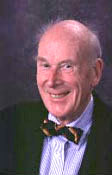UC Berkeley Press Release
Frederick E. Balderston, Haas School professor emeritus, dies at 84
BERKELEY – Frederick E. Balderston, a professor emeritus at the University of California, Berkeley's Haas School of Business, an authority on the savings and loan industry as well as on university administration, and an early experimenter with computer simulation of banking and marketing decisions, has died at the age of 84.
 Frederick Balderston |
The economist died Oct. 18 at his Berkeley home following a battle with emphysema, according to family members.
His 1984 book, "Thrifts in Crisis," examined the radical changes that hit the savings and loan industry following its 1980-1982 crisis of sky-high inflation and interest rates, and analyzed the industry's history from both regulators' and business perspectives. It also recommended that federal regulators institute new net worth reserve requirements to safeguard the financial integrity of savings and loan institutions.
At the time of the book's publication, Ken Rosen, a Haas School professor of real estate, called the book with Balderston's recommended road map for structural consolidation "essential reading for every business and government official in the thrift industry."
Haas School Dean Emeritus Earl F. Cheit said that when California's governor sought thrift industry advice in the 1960s, Balderston had been "willing to put his knowledge to the practical test" by serving for two years as California's savings and loan commissioner.
At the Haas School, Balderston was the first director of the former Center for Research in Management, guiding it through its formative period from 1961-1963. He also headed the center (now the Institute for Management Innovation and Organization) from 1965-1966 and from 1970-1979.
Balderston's father, C. Canby Balderston, was a professor at the University of Pennsylvania, dean of its Wharton School of Business and a member of the Federal Reserve Board.
A native of Philadelphia, Frederick Balderston came from a longtime Quaker family and was a conscientious objector during World War II. After attending Deep Springs College in California, he was a volunteer American Field Service ambulance driver and lieutenant attached to the British Army in Italy, Egypt, Palestine, Yemen and India from 1943-1945. After the war, he was one of the founders of the American Field Service education exchange program.
He earned his A.B. in economics at Cornell University in 1948, and his M.A. in 1950 and Ph.D. in economics in 1953 from Princeton University.
He was a research associate in economics at the Massachusetts Institute of Technology from 1950-1953 and joined UC Berkeley as an assistant professor in 1953.
"Balderston was a keen student of the strategic management of higher education institutions," said Cheit, adding that Balderston's book, "Managing Today's University," became a standard work in the field after first being published in 1974 and reissued in a second edition in 1995. The book reported findings of five years of research on university administration that was supported by the Ford Foundation. Balderston was a member of the board of directors of the National Center for Higher Education on Management Systems from 1972-1977.
He served as vice president of business and finance for the University of California system-wide offices from 1966-1968 and as the UC's vice president of planning and analysis from 1968-1970. From 1966-1969, he chaired the California State Committee on Public Education. He also served as a special assistant to the UC president from 1970 to 1975.
Balderston twice aided the business school's management, first as associate dean for the Graduate School of Business Administration from 1979-1981 and then as associate dean for academic affairs for the School of Business Administration in 1983. He also chaired a committee overseeing design for the school's current facilities, which opened in 1995, as well as the building campaign to fund it.
"Administrators and faculty committees relied on his judgment and competence on issues ranging from selecting an architect or siting a large sculpture to structuring a major student aid program," said Cheit. "In the business school and in the business world, Balderston was highly respected for the depth of his scholarship in strategic planning and management."
Balderston received the Berkeley Citation, the campus's highest honor, upon his retirement in 1991, and continued to teach for several years after.
"You could always count on Fred to do not only his part, but also his part as a good citizen of the school," said former colleague Raymond Miles, an emeritus professor at the Haas School.
Leo Helzel, an adjunct professor emeritus at the Haas School, recalled Balderston's "winning personality and absolutely fantastic smile" that added to his campus-wide popularity as an instructor and as a colleague. "He loved people, people loved him, and the students were crazy about him," Helzel said, adding that Balderston "could have made a success out of anything" from academia to the business world.
Balderston was described as a lover of the outdoors and owned ranch property in the Sierra community of Loyalton, north of Truckee. Relatives said he was devoted to building community and peace around the world.
He served on the board of directors of the California Nature Conservancy, the Bernard Osher Foundation and the Golden West Financial Corporation. Balderston also was a life trustee of Deep Springs College and the American Field Service international student exchange program.
Balderston is survived by his wife, Elizabeth, of Berkeley; four children, Daniel Balderston of Iowa City, Iowa, Sara Balderston of Columbus, Ohio, Thomas Balderston of Ardmore, Penn., and Jonathan Balderston of Berkeley; five grandchildren; and a brother, Robert Balderston of Baker City, Ore. His first wife, Judith, died in 1993, and he remarried in 2001.
A memorial service will be held at 2 p.m., Nov. 11 at the UC Berkeley Faculty Club. The family asks that in lieu of flowers, donations be made in Balderston's name to the Feather River Land Trust, P.O. Box 1826, Quincy Calif., 95971, or to AFS Intercultural Programs, 71 W. 23rd St., New York, NY 10010.

